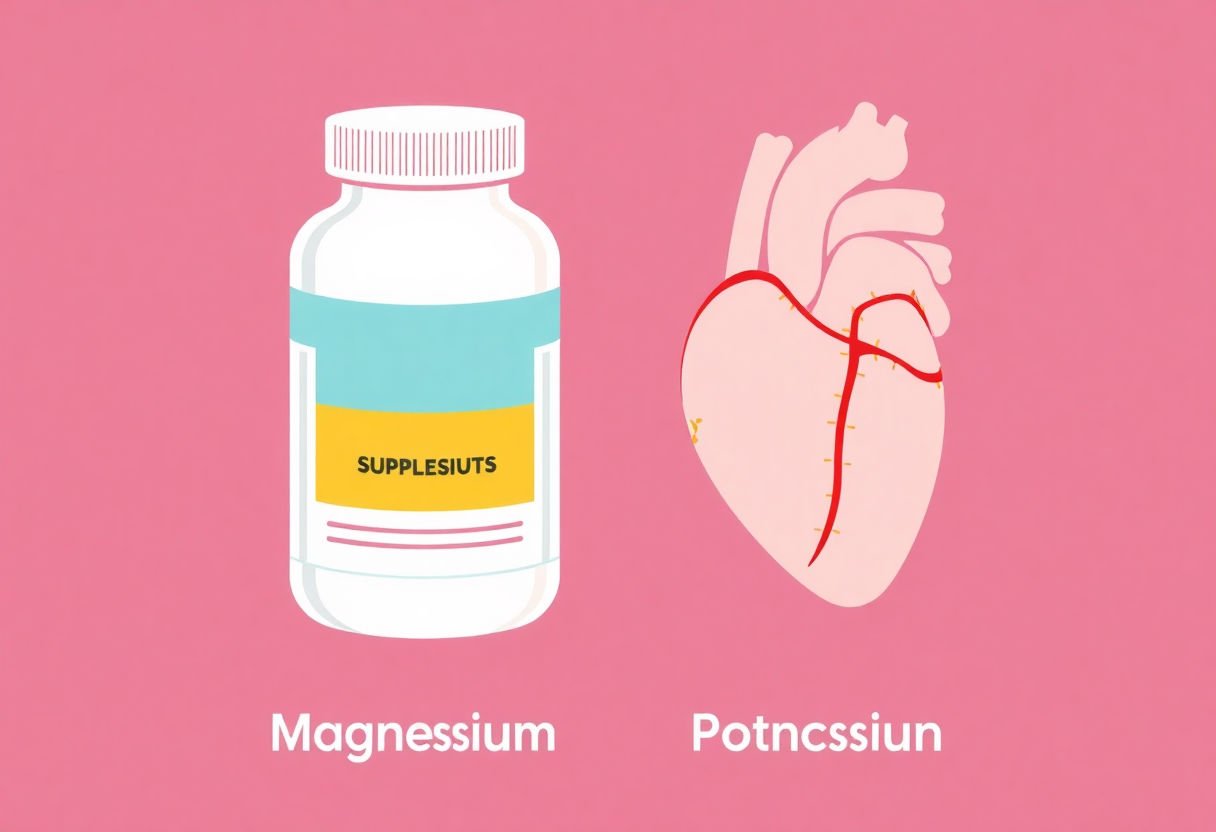Magnesium and potassium are key minerals integral to maintaining optimal heart health, influencing everything from heart function to blood pressure regulation. As modern diets often fall short in providing adequate amounts of these essential nutrients, supplements can play a pivotal role in ensuring their appropriate levels. This article delves into the intricate relationship these minerals share with cardiovascular health, the advantages of supplementing them, and how to wisely choose the right supplements. Readers will also gain insights into potential side effects, the necessity of consulting healthcare professionals, and how balanced nutrition complements supplementation. Continue reading to uncover the pathway to a healthier heart.
Key Takeaways
- Magnesium and potassium are essential minerals that play a crucial role in maintaining heart health and overall cardiovascular function.
- Supplementation can help achieve optimal levels of magnesium and potassium, which is particularly beneficial for individuals with dietary deficiencies.
- Both minerals contribute to the regulation of blood pressure and heart rhythm, thereby reducing the risk of heart disease.
- It’s important to consult a healthcare professional before starting any supplement regimen, especially for those with pre-existing health conditions.
- A balanced diet rich in magnesium and potassium complements the use of supplements, ensuring comprehensive heart health support.
Understanding Heart Health

Understanding heart health is essential for maintaining overall well-being, as the heart is the centerpiece of the body’s circulatory system. Its primary function is to pump blood, supplying oxygen and nutrients to tissues while removing carbon dioxide and other wastes. Several key factors contribute to heart health, including diet, exercise, and genetic predispositions.
A balanced diet rich in vegetables, fruits, whole grains, lean protein, and healthy fats plays a significant role in maintaining heart health. These foods provide essential nutrients, such as vitamins, minerals, and antioxidants, that help support heart function. Regular physical activity is equally crucial. The American Heart Association recommends at least 150 minutes of moderate-intensity aerobic exercise weekly to strengthen the heart muscle and improve circulation.
In addition to lifestyle choices, genetic factors can influence heart health. Some individuals may be predisposed to heart conditions based on their family history. Understanding these factors can guide appropriate lifestyle adjustments and preventive measures.
Stress management is another critical component of heart health. Chronic stress can negatively affect heart health by increasing blood pressure and heart rate. Techniques such as meditation, yoga, and adequate sleep can mitigate these effects.
In summary, maintaining heart health involves a comprehensive approach that combines dietary choices, physical activity, awareness of genetic factors, and stress management. This holistic viewpoint ensures the heart functions optimally, significantly contributing to overall health and longevity.
The Role of Magnesium in Cardiovascular Health

Magnesium plays a crucial role in cardiovascular health, acting as a vital component in maintaining a healthy heart rhythm and supporting overall heart function. Magnesium is essential for the regulation of muscle contractions, including those of the heart, making it pivotal in preventing irregular heartbeats and ensuring a stable heart rate.
Moreover, magnesium contributes significantly to blood pressure regulation. It works by relaxing the blood vessels, which can help lower blood pressure and reduce the strain on the heart. This mineral’s ability to dilate blood vessels can lead to improved blood circulation, a key factor in reducing the risk of hypertension—a major contributor to heart disease.
Research underscores the importance of magnesium in minimizing the risk of heart disease. Individuals with adequate magnesium levels often exhibit a lower incidence of cardiovascular conditions such as coronary artery disease and arrhythmias. This correlation suggests that magnesium deficiency might increase the vulnerability to heart-related issues.
Additionally, magnesium aids in balancing other electrolytes, most notably potassium and calcium, which are critical for heart health. The interplay between these minerals ensures efficient nerve function and muscle relaxation, forming a protective barrier against the onset of cardiovascular diseases.
While magnesium can be obtained from food sources such as nuts, leafy greens, and whole grains, supplements might be necessary to meet daily requirements, especially for individuals with dietary restrictions or absorption issues. Ensuring adequate magnesium intake through diet or supplements can play a preventative role in maintaining optimal cardiovascular health and mitigating heart disease risks.
The Role of Potassium in Cardiovascular Health

Potassium is a crucial mineral widely recognized for its significant impact on cardiovascular health. Its primary function is regulating heart rhythm, an essential aspect of maintaining a healthy heart. Proper levels of potassium ensure that the heartbeats remain steady and consistent, reducing the risk of arrhythmias—a condition where the heart beats irregularly.
Moreover, potassium plays a pivotal role in managing blood pressure. The mineral helps balance the adverse effects of sodium in the body, thereby contributing to normalizing blood pressure levels. This balance is vital in preventing hypertension, a critical risk factor for heart diseases. Studies have indicated that an adequate intake of potassium is linked to a lowered risk of stroke and other cardiovascular complications.
Additional benefits of potassium include:
- Supporting muscle function: Ensures that the cardiac muscles contract effectively, promoting optimal blood circulation.
- Reducing the risk of cardiovascular events: Adequate potassium can decrease the risk of both stroke and coronary artery diseases.
It’s noteworthy that the daily recommended intake of potassium for adults in the United States is approximately 2,600 to 3,400 mg. Consumption through a diet rich in fruits, vegetables, and whole grains is ideal; however, supplements might be considered, especially when dietary intake doesn’t meet the necessary requirements. Always consult a healthcare professional before starting any supplement regimen to ensure it aligns with individual health needs and conditions.
In sum, potassium is indispensable for maintaining cardiovascular health, aiding in the regulation of heart rhythm, and mitigating blood pressure concerns.
Benefits of Magnesium Potassium Supplements
Magnesium and potassium supplements offer numerous advantages for enhancing heart health, an organ that thrives on these essential minerals. These supplements can be particularly beneficial for individuals who struggle to meet their required intake through diet alone, ensuring that the body maintains critical bodily functions.
One of the primary benefits of these supplements is their role in maintaining optimal cardiovascular function. Magnesium plays a significant role in regulating heart rhythms, and a deficiency can lead to arrhythmias. By taking magnesium supplements, individuals may experience a reduction in irregular heartbeats and a stabilized pulse.
In addition, potassium helps regulate blood pressure levels, which is crucial for minimizing the risk of hypertension and related cardiovascular issues. Consistent supplementation can aid in maintaining balance within the body, reducing strain on the heart and blood vessels.
Taking magnesium and potassium together also provides potential synergy. Both minerals operate to support the Relaxation-Contraction Mechanism in muscle tissues, including the heart muscle, thus enhancing overall cardiovascular endurance and efficiency.
Listed benefits further include:
- Improved cellular energy production, leading to enhanced heart function.
- Support in preventing the buildup of plaque in arteries when combined with a balanced diet.
- Potential reduction of muscle cramps associated with deficiencies, supporting circulatory health.
By ensuring adequate levels of these vital nutrients, magnesium and potassium supplements serve as a proactive measure toward safeguarding heart health, contributing to a comprehensive wellness strategy. However, as with any supplement, personal health conditions should be considered, advising speaking with healthcare professionals prior to starting supplementation.
Choosing the Right Supplements
Selecting the appropriate magnesium and potassium supplements is crucial for supporting optimal heart health. Begin by evaluating the supplement types available. Magnesium supplements often include magnesium citrate, magnesium glycinate, and magnesium oxide, each differing in absorption rates. Magnesium citrate, for instance, offers higher absorption, making it a preferred option for many. Similarly, potassium supplements are found in forms such as potassium chloride and potassium gluconate.
When choosing supplements, consider the recommended dosages. For magnesium, the daily recommended intake is typically between 310-420 mg for adults, while potassium recommendations are 2,600-3,400 mg. However, actual needs can vary, hence it’s essential to assess dietary intake of these minerals before supplementation. Never exceed the upper intake levels without consulting a healthcare professional, as overdosage can lead to adverse effects.
Quality is paramount; look for supplements verified for purity and potency by reputable third-party organizations. The presence of additional ingredients should also be noted to avoid unnecessary fillers or allergens.
Potential interactions with medications or underlying health conditions must be considered. Magnesium can interact with antibiotics and heart medications, while potassium might affect blood pressure medication efficacy. Thus, consulting with a healthcare provider before starting any supplement regimen is advisable.
Ultimately, the right choice of supplements tailored to your specific health needs can significantly contribute to maintaining heart health. By adhering to appropriate guidelines and seeking expert guidance, supplements can be a valuable component of a heart-healthy lifestyle.
Potential Side Effects and Precautions

When considering magnesium and potassium supplements for heart health, it’s essential to be aware of potential side effects. Although generally safe for most individuals, adverse effects can occur, particularly if taken in excessive amounts or combined with certain medications.
Common Side Effects:
- Magnesium: High doses can lead to digestive issues such as diarrhea, nausea, and abdominal cramping. In rare cases, excessive magnesium intake may cause more severe symptoms like irregular heartbeat or hypotension.
- Potassium: Overconsumption might lead to hyperkalemia, a condition characterized by dangerously high potassium levels. Symptoms include weakness, fatigue, and in severe cases, heart arrhythmias.
Precautions:
- Existing Health Conditions: Individuals with kidney disease or adrenal insufficiency should be vigilant, as these conditions can affect mineral balance and increase the risk of complications.
- Medication Interactions: Both magnesium and potassium supplements can interfere with certain medications, including diuretics, ACE inhibitors, and some antibiotics. These interactions could either enhance or diminish the drug’s efficacy.
To avoid these issues, it is advisable to:
- Start with lower doses and gradually increase as needed, while regularly monitoring your body’s response.
- Consult with a healthcare professional before starting any supplementation, especially if you are pregnant, breastfeeding, or have underlying health conditions.
- Monitor your intake of fortified foods and other sources of these minerals to avoid unintentional overconsumption.
By understanding these side effects and taking proper precautions, you can safely incorporate magnesium and potassium supplements to support heart health.
Consulting Healthcare Professionals
When considering the addition of magnesium and potassium supplements to your regimen for heart health, it is crucial to consult healthcare professionals. These supplements can interact with medications or be contraindicated in certain medical conditions. An informed discussion with a doctor ensures personalized advice that takes into account your unique health profile.
For individuals with pre-existing health conditions, such as kidney disease or heart disorders, professional guidance is even more essential. Supplements can affect electrolyte balance, which is particularly sensitive in these cases. A healthcare provider can conduct necessary evaluations, such as blood tests, to determine appropriate dosage and monitor ongoing health impacts.
Medication interactions are another critical consideration. Magnesium and potassium supplements can interact with common medications, including blood pressure drugs and diuretics, altering their effectiveness. It’s essential to review any potential interactions with a healthcare provider, who can adjust your treatment plan if necessary.
Customized supplementation plans should be developed based on a thorough assessment of dietary intake and existing nutrient levels. Healthcare professionals can provide tailored advice on integrating supplements with a balanced diet, minimizing risks and maximizing benefits.
Moreover, they can help establish a monitoring routine to observe the effects of supplementation on your heart health, making adjustments as needed. This approach not only supports optimal heart function but also enhances overall well-being through balanced nutritional intake.
In summary, engaging with healthcare providers forms an integral part of safely incorporating magnesium and potassium supplements into your heart health strategy, ensuring both efficacy and safety tailored to your personal needs.
Achieving Balanced Nutrition

To maintain optimal magnesium and potassium levels, it is essential to integrate these crucial nutrients into a balanced diet while also considering supplementation. Food sources rich in these minerals offer not only the nutrients themselves but also other beneficial compounds that supplements alone may not provide.
Key Magnesium Sources
- Leafy greens such as spinach and kale are excellent for magnesium, providing an array of other vitamins and minerals.
- Nuts and seeds, including almonds, cashews, and sunflower seeds, are convenient snacks that help boost magnesium intake.
- Whole grains like brown rice and quinoa offer a substantial magnesium content, enhancing cardiovascular health.
Rich Potassium Sources
- Bananas are well-known for their potassium richness, perfect for maintaining proper nerve and muscle functions.
- Avocados are both delicious and an exceptional source of potassium, alongside healthy fats.
- Sweet potatoes not only provide potassium but also fiber and vitamin A, making them an ideal addition to a heart-healthy diet.
Dietary Balance and Supplements
While diet is a principal component of nutrition, supplements can play a vital role in achieving necessary magnesium and potassium levels, particularly if dietary intake falls short. It’s important to note that supplements should not replace a balanced diet but rather complement it.
Balancing both dietary intake and supplements can ensure adequate daily requirements are met. By choosing a diet enriched with these nutrients and responsibly using supplements, individuals can significantly support their heart health, contribute to overall well-being, and meet their unique physiological needs.
Conclusion
In conclusion, both magnesium and potassium play a critical role in sustaining cardiovascular health by regulating heart rhythm and blood pressure. While supplements can assist in maintaining these vital nutrients, they should be integrated into a comprehensive wellness strategy that includes a balanced diet and regular health consultations. Looking ahead, embracing these nutrients may contribute to substantial improvements in heart health outcomes. Therefore, individuals are encouraged to consider these supplements as a proactive measure, while always seeking professional medical advice to tailor their approach to their unique health needs.
Frequently Asked Questions
What are the benefits of magnesium and potassium supplements for heart health?
Magnesium and potassium supplements can help regulate heart rhythm, control blood pressure, and reduce the risk of cardiovascular diseases. They are essential for the proper function of heart muscles and overall cardiovascular health.
Can everyone take magnesium and potassium supplements?
While these supplements can be beneficial, they are not recommended for everyone. It’s crucial to consult with a healthcare professional before starting any supplementation, especially for individuals with existing health conditions or those taking other medications.
Are there any side effects associated with these supplements?
Possible side effects include gastrointestinal issues such as diarrhea and nausea, or more serious conditions if taken in excessive amounts. It is important to adhere to the recommended dosages and discuss any concerns with a doctor.
How should one choose a high-quality magnesium and potassium supplement?
Look for supplements from reputable manufacturers that have undergone third-party testing for purity and potency. Be aware of the form of magnesium and potassium, as bioavailability can vary between types.
Is it necessary to take supplements if I have a balanced diet?
A balanced diet may provide sufficient magnesium and potassium levels; however, supplements can be beneficial if your dietary intake is inadequate. A healthcare provider can help assess whether supplementation is needed based on individual dietary habits and health conditions.
